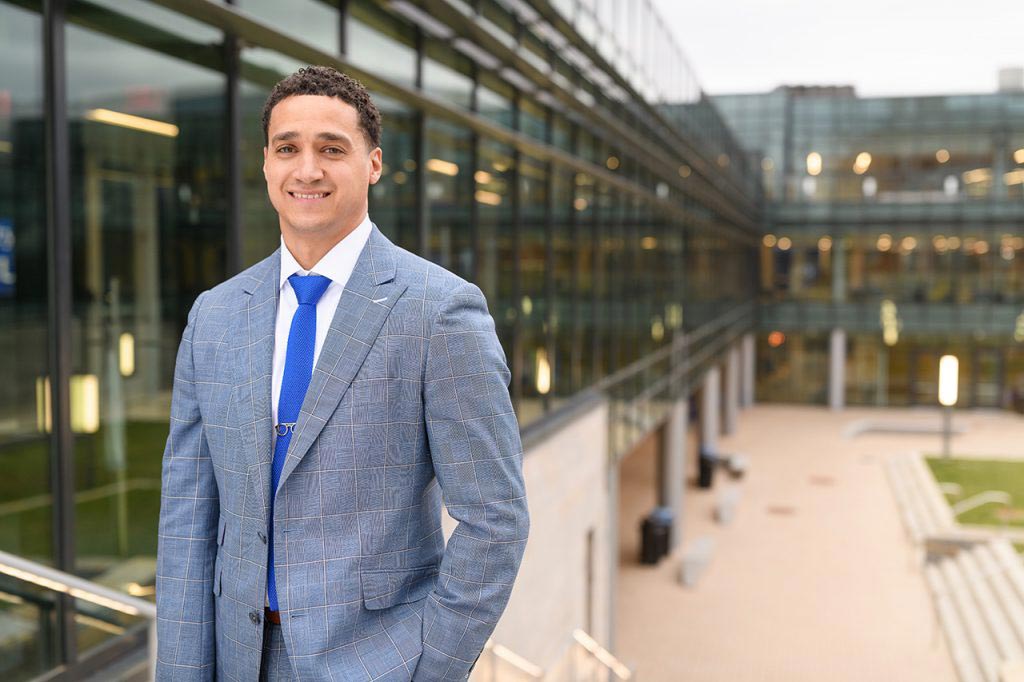The Importance and Benefits of Practicing Self-Care in Social Work and Other Helping Professions: A Conversation With Dr. Jay Miller
| 12 Min Read
Social workers are tireless in their all-important efforts to help people in need. Yet, despite the challenging nature of their work, many social work practitioners struggle to engage in adequate self-care.
Fortunately, people like Dr. Justin “Jay” Miller, Dean & Dorothy A. Miller Research Professor in Social Work Education at the College of Social Work at the University of Kentucky, are dedicating themselves to changing that. Dr. Miller is deeply passionate about self-care for social workers, teachers, healthcare providers, and other helping professionals — so much so that he created a lab at UK devoted to researching and improving self-care.

Personal Journey to Social Work and Self-Care
Dr. Miller’s path to self-care was very personal. “I hope you will pardon the quintessential fairy-tale type feel of what I am about to share — but from the time I was seven years old, I knew that I wanted to be a social worker. Having spent time in foster and kinship care, being and identifying as a social worker is something that became very meaningful to me,” he says. So, when it came time to pick a major in college, he had already been fully committed to social work for years. “You could not tell me that I was not going to save every foster kid that ever was.”
After graduation, Dr. Miller began working for Child Protective Services (CPS), which was exactly what he wanted to do. “I had been there; I knew what it was like. I wanted to use my experiences to inform my practice with young people who were experiencing abuse and neglect,” he explains.
During his time with CPS, he became obsessed with the work. “There were times I would work my day job and then immediately go to another unit to do night assessments. My day would start at 8:00 AM and end at 1:00 AM. Sometimes I would sleep in my office, wake up, and then start all over again,” he says. “I knew how important it was to devote a certain amount of time and a special kind of attention to the work.”
Years went by, and the job started to take a toll on Dr. Miller.
“I had reached a place that I had told myself I would never get to, where I was burned out and jaded,” Dr. Miller explains. “Every case started to look the same, and it was on that day that I decided I was going to really think through not just what people do for work, but how they do their work.”
If he could get burned out, having been a child of the foster and kinship care systems and knowing what it was like firsthand, then other social workers who didn’t have that context were also going to be struggling.
Dr. Miller had always viewed himself as a child welfare researcher. “To be perfectly honest, I never wanted any part of self-care. It was the furthest thing from my mind,” he remarks. “After the experience with CPS, I decided to do a couple of research studies and co-author a book about self-care in social work and other helping professions, and my interest in the subject has been growing ever since.” He recognized that, regardless of what area of social work a person is in, if they’re going to do their best work, they have to be well and feel good about what they’re doing.
So, Dr. Miller wants to put all practitioners in that mental and emotional space. “Social workers are everywhere, and the world doesn’t run without them. I want them to be able to put their best foot forward. Ultimately, that requires self-care.”
Research and Global Partnerships Through the Self-Care Lab
Several years ago, Dr. Miller focused his research attention on addressing the phenomena of burnout, vicarious trauma, and other problematic employment conditions.
“Through a grant, I launched the self-care lab,” Dr. Miller states. “It was the first known entity explicitly dedicated to doing empirical work around self-care. I started it as a strategy to understand self-care practices and, perhaps more importantly, learn how we can better support professionals in understanding the importance of, and strategies for, engaging in self-care.”
Through the work of the lab, Dr. Miller and his colleagues began to learn that social workers and other helping professionals engage with and talk about self-care in silos. This approach is the habit of discussing or thinking about a subject or issue in isolation, as it relates to one’s own specific job, discipline, or area within a field — without considering the way that topic or problem applies to the broader context of one’s organization or one’s whole field. It often leads to a lack of communication and information sharing between departments or institutions.
Whether you’re working in protective services with children, at a nursing home with aging people, or at a hospital or non-profit with cancer patients and their families, self-care is going to be relevant to and necessary for you. “One thing that we have learned from our work in the lab is that self-care is a concept that transcends practice areas and geographic boundaries,” says Dr. Miller. “The more work we shared about self-care, the more emails I got from practitioners around the world about their struggles with engaging in self-care.”
In response, Dr. Miller launched the Global Self-Care Initiative. This international partnership network, which has grown to over 17 countries, focuses on cultural nuances of professional workplaces and how self-care can help mitigate the stress caused by these workplaces. Having traveled and given lectures on self-care in many parts of the world, Dr. Miller is often struck by how differently people work. “A lot of how helping professionals go about their practice is influenced by their cultures. And what I hope we are able to do through The Global Self-Care Initiative is create a common language and supportive structure around self-care in social work and all helping professions,” he adds.
Opportunities for Online Students to Interact With the Self-Care Lab
Dr. Miller and his staff provide learners with a multitude of opportunities to engage with the self-care lab. There are the academic and training offerings enabling students to learn more about self-care as a science, which Dr. Miller and his faculty and partners are focused on advancing. But they are also passionate about tailoring the lab to the specific goals of scholars, so their approach is driven by what each individual student wants to get from the experience.
“A lot of people talk about self-care in a superficial way. It is much more than mindfulness classes, bubble baths and yoga. While these things are cool and are certainly examples of self-care practices, in the lab, we are focused on the concept of self-care. Ultimately, self-care is a subjective thing that everyone has to define for themselves. And, no matter how one defines it, we want to create a culture that supports it,”says Dr. Miller. He and his team help learners figure out how they can engage in a sustained career by building up common practices for resilience and wellness.
In The Self-Care Lab, students are involved in a variety of different projects and often have opportunities to travel around the country, giving presentations about work they have done in the lab. “We really try to engage with learners, and our students are welcome to be a part of any of our ongoing projects,” Dr. Miller states. “We also work to create opportunities where our faculty, staff, and students can receive grants and other support to explore their own ideas pertaining to self-care.”

In addition to the formal work at the lab, when students are at their practicum placements or doing small group assignments, they are encouraged to think about how they can integrate self-care into all parts of their training. “Some of them want to learn more about self-care in social work for themselves; others want to publish papers and do their own assessments and research. Our objective is to support them in doing what they want to do, not what we want them to do,” Dr. Miller notes. He and his team welcome opportunities to engage in discussions with students.
To date, Dr. Miller has had undergraduate, graduate, and Ph.D. students all together in the self-care lab. “Increasingly, potential students make their college decisions based on where they can be actively and meaningfully involved in research and other projects. We are certainly committed to making those opportunities available to our students,” he says.
Important Parts of Self-Care and Ways Employers Can Reduce Burnout and Compassion Fatigue in Social Workers
Through his work in the lab, Dr. Miller has developed the Self-care Actualization Theory. Rooted in research that has been conducted in the lab, this theory suggests that self-care is not innate, but rather, a professional skill that can and must be learned, fostered, and developed. In the same way that practitioners can learn interviewing skills or research concepts, so too can they learn and hone self-care skills. And in the UK College of Social Work, that’s one of the ways he and his faculty have approached teaching students about it.
“It’s important for people to get over the myths and misnomers about self-care,” says Dr. Miller. “It is not something that just happens. We must be intentional about self-care. In our college, we conduct self-care trainings and even have credit-earning self-care courses. Simply put, we are serious about it.”
A lot of times, people wait around for the “perfect time” to practice self-care, but it never comes. Self-care is something that needs to be integrated into your life. It is not just about what you do for work — it is a crucial aspect of how you work. You have to think about and adapt the practices you take on every day to ensure you are being mindful of your own wellness.
From an organizational perspective, some similar concepts apply. First off, businesses, agencies, institutions, and supervisors have an obligation to make sure their employees are practicing self-care. “As an administrator, it is my responsibility to ensure I put my faculty, staff, and students in spaces to engage in self-care,” Dr. Miller states. “That involves looking at policies, practices, procedures, and protocols that lend credence to or support that self-care. We really try to be creative about providing that support.”
Secondly, it’s important to recognize that self-care is about restructuring our work — and the time we spend at work — to be conducive to our wellness. It’s not the number of days professionals come to work each week that matters; it’s what they do with the days. So, Dr. Miller and his faculty and students have a lot of candid conversations about that. “There are a lot of studies — many of them out of Europe — about the concept of the four-day work week. The authors have found that many of the things administrators or organizational leaders believe are integral to getting better work out of their employees are actually the things that hinder good work,” he explains.
By reframing and restructuring and getting people to understand that it’s how they work that really matters, Dr. Miller has found that he and other administrators and executives can integrate a better strategy into social work. “We have a responsibility: it’s the right thing to do from an innate humanity standpoint, and, if you want people to be productive and retained, self-care is indispensable,” he says.
Organizations often talk about retention and how much it costs to lose somebody and train someone new. As Dr. Miller points out, people want to work at a place that is conducive to them being well, so if you create that environment, you’ll increase employee longevity and reduce training, recruiting, and other costs. “We get into the myth of thinking self-care in social work has to be expensive or that it’s solely an HR function, but it’s not — it’s an investment we make in our people, and ultimately, one that delivers a huge return.”

Lessons From Experience
Another thing Dr. Miller has learned over the years is that not everything that soothes you is self-care. He wrote an article about pernicious practices, which are behaviors that helping professionals think are healthy but really are not. And they’re different for various people. “The fact that something suits you and makes you feel good does not mean it is self-care,” he asserts.
Dr. Miller stresses that social workers have to take a critical appraisal of what they’re doing — and when it comes to self-care, knowing what not to do is just as important as knowing what to do.
“A lot of times, people talk about self-care planning and the things they want to do. But in one of our classes, I lead students in an exercise where we talk about things they want to stop. Often, people don’t consider those. And it’s powerful for them to think about the everyday actions, behaviors, people, and things they need to remove from their lives to be well and do their best work,” he says.
Opportunities to Learn More
Whether you are already passionate about social work or simply interested in learning more about the field and how to properly take care of yourself, so that you can do your best work in a healthy way, the College of Social Work at the University of Kentucky offers a path for you. The school provides the online Bachelor of Arts in Social Work, Master of Social Work, and Doctorate of Social Work.
To explore these degrees as well as the University of Kentucky CoSW’s unique and pioneering self-care lab, please fill out the form located here or call 1-833-358-1721.